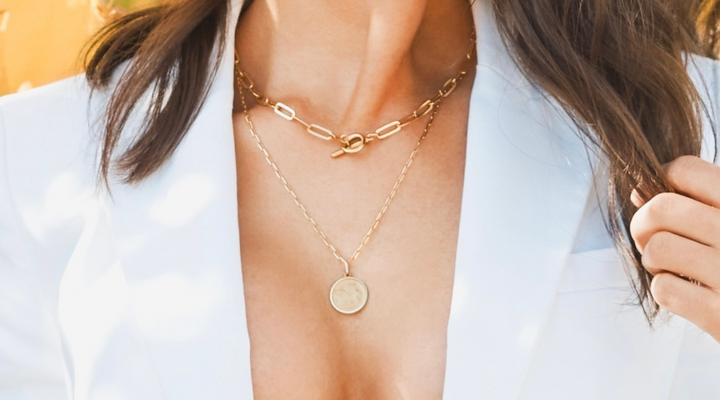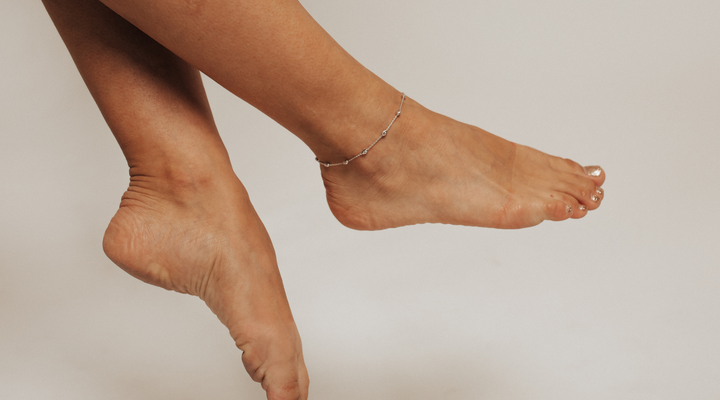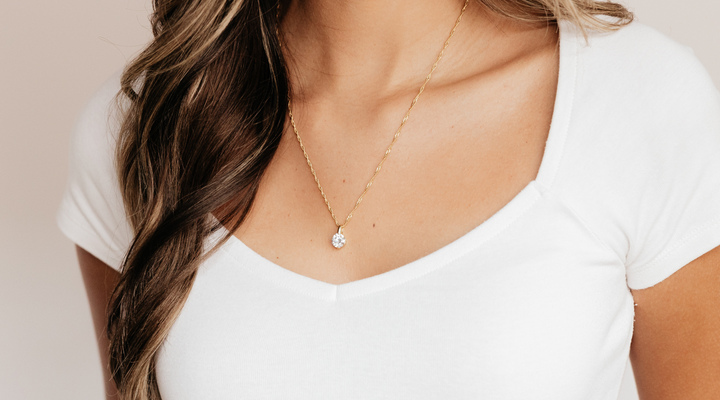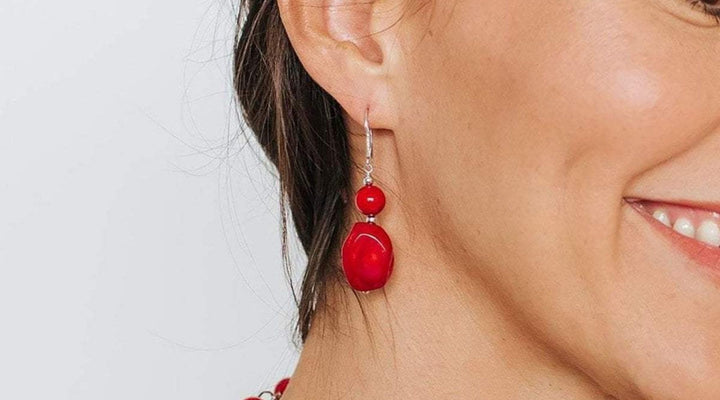A History of Ancient Roman Jewelry
Posted by Deven Davis on
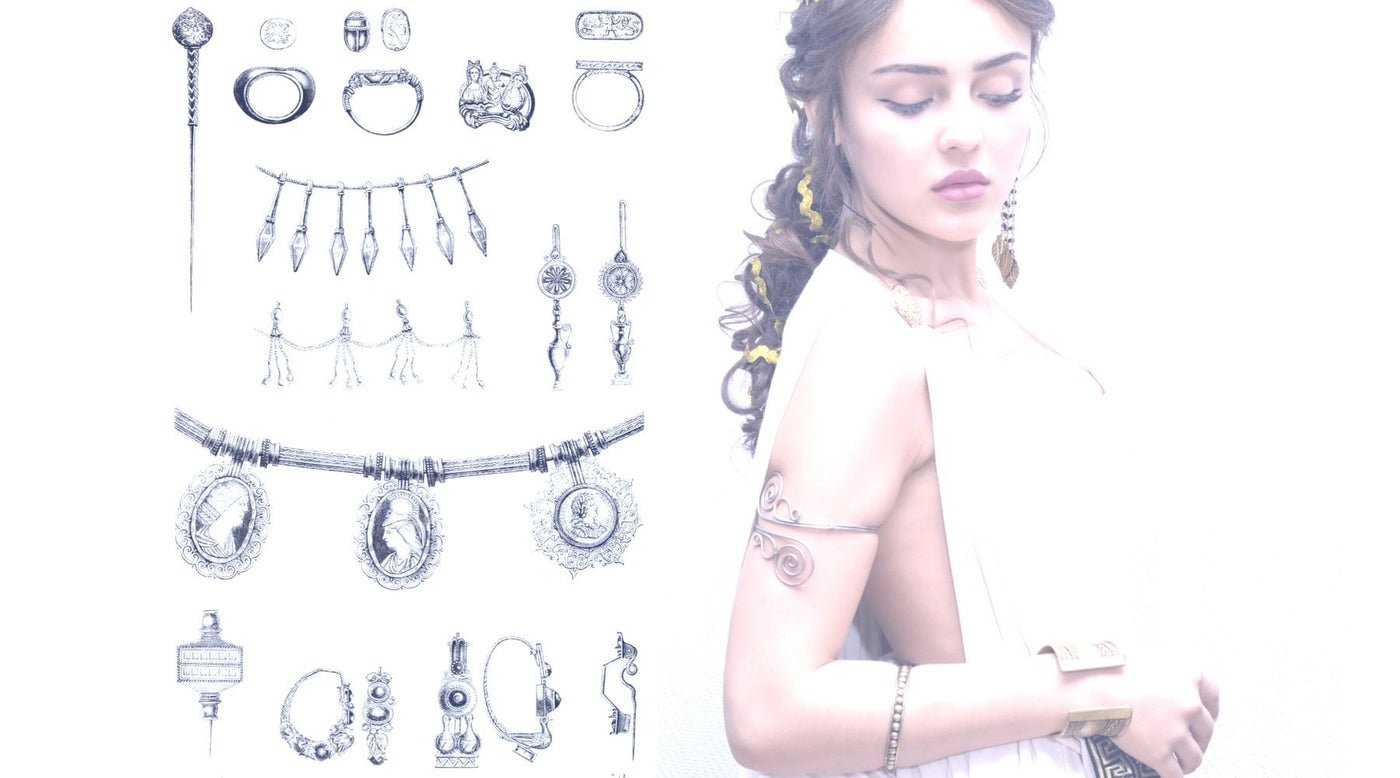
A History of Ancient Roman Jewelry
From Roman glass bracelets to earrings and pendants, there is something for every taste and style. Click here for a brief history of ancient Roman jewelry so you can better understand what type of statement you're making by wearing it.
Keyword(s): ancient Roman jewelry
Did you know the Romans would wear amulets, alongside other kinds of jewelry to ward off evil spirits and deadly curses? Pretty interesting, huh? A little different to why we accessorize our outfits today!
Well, if you enjoyed that fun fact, we're confident you'll love the rest of this blog post. Keep reading to find out more about ancient Roman jewelry!
A Brief History
If you had to describe ancient Roman jewelry, then the best phrase to use would be: 'intricate designs.' The Romans used a plethora of different metals, colors, stones, and beads, etc. to craft extraordinary pieces.
All the resources available to them inspired the kinds of materials used to craft the jewelry, as well as their stunning designs.
They got most of their metals and gems from the Mediterranean territories they resided in, as well as the exotic imports delivered from Persia and India.
Ancient Roman Jewelry for Men
It wasn't uncommon for wealthy men to wear silver rings, bracelets with collars, pendants, and torcs.
Men would often wear rings with engraved gems. There were then used to impress the wearer's rank or their family crest into the wax that would seal their letters, and thus the birth of 'signet rings'.
You've probably heard of the infamous Roman dictator, Titus Manlius. In 361 BC he confronted a Gaul to a fight and murdered him. Titus then stole his torc and wore it.
From that moment forward, soldiers were awarded torcs if they did something brave during battle.
Ancient Roman Jewelry for Women
Roman women would curate large collections of jewelry often in a set. It was common for them to wear more jewels than the men.
It was fashionable for ladies to wear all of the following at the same time:
- Rings (usually more than one, showcasing various metals and designs).
- Earrings
- Bracelets
- Necklaces (often a choker style)
Even the more practical accessories like brooches were decorated using colorful stones, and precious metals.
Women would usually pierce their ears, yet they would only wear one set of earrings at a time.
Fun Fact: Jewelry was massively important to women because it was generally considered their property.
They could keep their jewelry separate from their husband's wealth and use as they felt necessary i.e., they could buy, sell, and give away their jewelry, however, they saw fit.
Did the Romans Make Jewelry Better?
You may have noticed that Roman jewelry resembles both Greek and Etruscan designs.
Formerly, Roman jewelry was way more conservative in comparison to other Mediterranean cultures that were around at a similar time.
However, as the Romans invaded new territories, this led to greater resources as well as lifestyles full of grandeur and luxury. Hence, jewelry became more opulent.
Fun Facts About Ancient Roman Jewelry
The Romans had a very strict social hierarchy, and jewelry was worn to indicate your particular social status.
Below we've gone into greater depth on the kind of jewelry they used to wear, and why:
Rings
Romans would wear massive, eye-catching rings that indicated their social status. Here's a quick rundown of who would wear what:
- Senators and Bureaucrats: wore gold rings with a generously sized gemstone, so everyone could see at a glance how important they were.
- Plebians (also known as the commoners): were only allowed to wear rings made out of iron. Occasionally, they were awarded golden rings for bravery in battle (which obviously they were allowed to wear).
Bracelets
Bracelets were typically made from gold and pearls and would adorn both wrists. They had a purely decorative function. It wasn't uncommon for bracelets to depict coiling snakes, fastened by golden pins.
Fun Fact: for the Romans, snakes symbolized immortality!
Typical Materials
Check out some of the materials the Romans would make their jewelry from:
Gold
At the beginning of Roman civilization, gold was rare. So much so, it was frowned upon to be used for jewelry because they needed it to craft their currency.
However, like we've already said, as their empire expanded, so did their resources, and so the use of gold to craft jewelry became fashionable.
Pearls
Romans loved pearls!
Fun Fact: The notorious emperor Caligula adored pearls. He has slippers decorated with this gem, and rumor has it, he even had a pearl necklace for his horse!
Typically, the Romans would wear their pearls to fancy occasions such as processions and parties, i.e., pearls would be used to accessorize an 'evening wear' style outfit.
Amber
The Romans spent a lot of time and effort sourcing Baltic Amber because jewelry makers loved this stone!
They created a route to transport amber from what is now known today as the Polish city of Gdansk to towns all over the empire.
Fun Fact: not only did they think this stone was beautiful, but it's believed the Romans thought this stone could cure illnesses- which is probably why it was massively popular!
Glass
The Romans developed advanced glassmaking techniques and took advantage of the supply of sand in and around Israel to feed the popularity of the new sea-hued glass. Some of the glass made it's way into jewelry, and in recent times, this ancient glass has been excavated and set in sterling silver for a modern display of ancient Roman jewelry.
Did You Enjoy This Blog Post?
We hope you found this article on ancient Roman jewelry interesting. If you did, we're confident you'll love the other features published over on our 'All That Glitters' blog.
Over there we discuss everything from what rose gold really is to how to work out whether you have jewelry made from genuine silver. Enjoy!
Alternatively, if you have any questions about this blog post or jewelry more generally, then please feel free to reach out and contact us. We'd love to hear from you!
Just fill out the user-friendly contact form, and one of our professional team members will get back to you as soon as they can!
Like this blog post? Don't forget to pin it!


